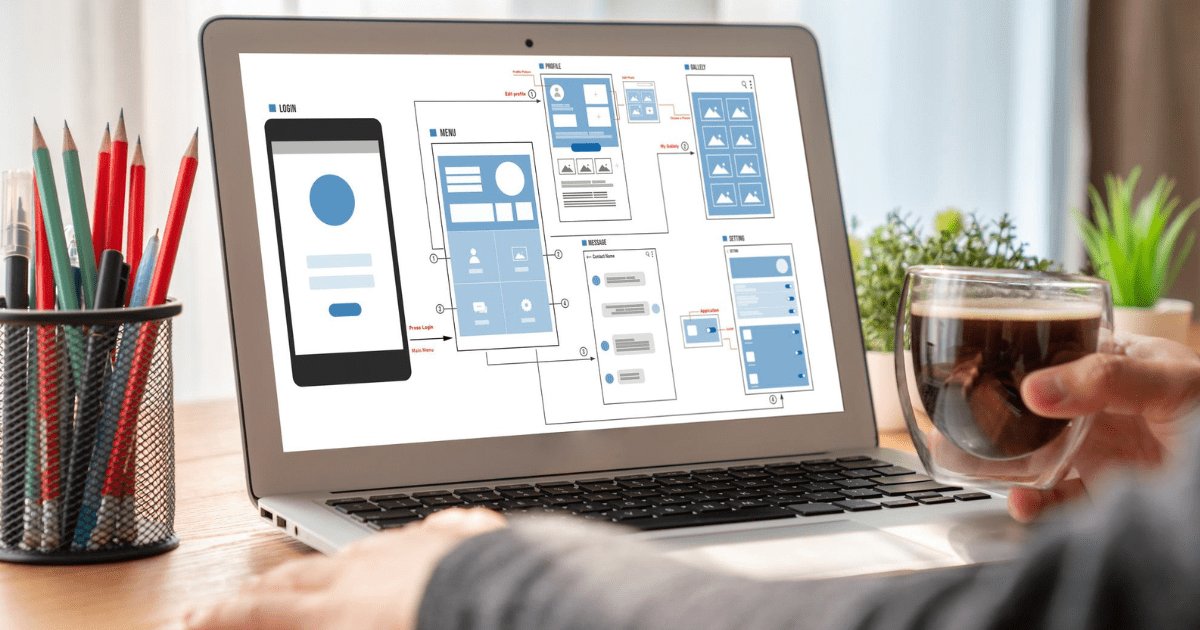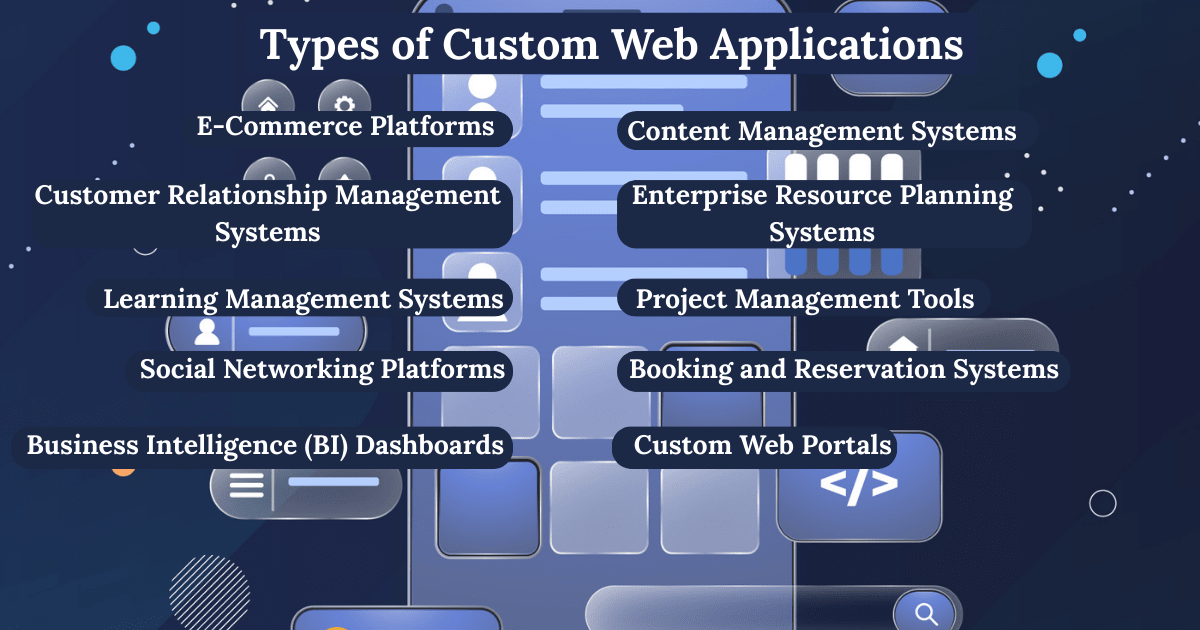Custom Web Application Development: A Complete Guide
Custom web application development offers tailored digital solutions designed to meet unique business needs. It enhances efficiency, security, and scalability while delivering user-friendly experiences. Choosing a reliable partner ensures long-term success and growth.

Custom web application development has become necessary as enterprises pursue customized online solutions. In comparison to off-the-shelf programs, custom web applications are flexible to specifications. They enhance performance, scalability, and user experience. As the competition increases, businesses require more customizable and personalized platforms. A custom web application would be useful in that scenario. In this article, we will discuss custom web application development in detail. Let's dive in.
What is Custom Web Application Development?
Custom web application development involves development of online software to meet specific business requirements. Compared to generic off-the-shelf applications, the specific applications are consistent with the operations and goals.
These solutions are scalable to the size of your business and offer complete control over features and user experience. Companies that deploy custom web apps have reported 50 percent increased customer retention rates.
Advantages of Custom Web Application Development

The use of the appropriate application can change the performance of businesses. The following are the advantages of using custom web application solutions.
Tailored Functionality to Exact Needs
A custom web app is developed around your specific business processes and objectives. It contains the necessary features without oversized complexity and provides more staff productivity.
Scalability and Flexibility
Bespoke web application development enables application to scale and evolve with business growth. It allows you to add features, serve additional users or combine new tools without switching the entire system.
Enhanced Security and Data Protection
Custom web applications strengthened security provisions that are specific to your industry needs. There are fewer threat vectors since you have control over access, infrastructure and code.
Long-Term Cost Effectiveness
It might be expensive initially, yet the bespoke solutions eliminate recurring license fees and support. Over time, ROI improves.
Competitive Advantage and Unique Branding
When you establish a customized web application, your product or offering becomes prominent. Special features, user experience, and customer workflows will make you stand out.
Seamless Integration with Existing Systems
A custom web application can be developed to integrate with your current software, databases, or tools. This interoperability minimizes duplication, errors and data silos.
Types of Custom Web Applications

Custom web applications are user-specific business applications. It is better to know their types to decide which one fits your purpose.
1. E-Commerce Platforms
The e-commerce platforms enable companies to sell their product/services effectively over the internet. They consist of product catalogs, shopping carts and secure payments.
2. Content Management Systems (CMS)
The CMS systems enable control of site content without technical skills. Users are able to create, update and publish content quickly.
3. Customer Relationship Management (CRM) Systems
CRM systems store and monitor customer data, customer interactions and communications. They assist companies to create relationships and enhance retention as well as handle leads efficiently.
4. Enterprise Resource Planning (ERP) Systems
ERP systems coordinate business processes, such as your accounting, inventory, and HR. They deliver real-time data, simplify work processes and enhance efficiency.
5. Learning Management Systems (LMS)
LMS systems provide and monitor training or education resources. Users are able to enroll online courses, quizzes, and certifications. They facilitate both areas of corporate training and education management.
6. Project Management Tools
Project management tools assist teams in planning, importing and monitoring tasks. The characteristics such as timelines, collaborative spaces and reporting enhance productivity.
7. Social Networking Platforms
Users can communicate, share content and connect with others on social platforms. They contain profiles, messaging and content feeds.
8. Booking and Reservation Systems
Booking systems allow clients to book services or reservations through the Internet. It is beneficial to industries such as hospitality, healthcare, and entertainment.
9. Business Intelligence (BI) Dashboards
BI dashboards display the business data in a visual form for analysis. They bring together various data sets and measure indicators.
10. Custom Web Portals
Web portals are a centralized access to personal services or information. Both B2B and B2C platforms provide custom experiences.
Essential Features to Consider in a Custom Web Application
Selecting the appropriate features makes your custom application achieve business objectives. These are the features to consider in a custom web app.
| Feature | Description | Benefit |
|---|---|---|
| User-Friendly Interface | Simple and intuitive design for easy navigation | Improves user adoption and reduces training time |
| Scalability | Ability to grow and handle increased users or data | Supports business expansion without system replacement |
| Security & Data Protection | Strong encryption, authentication, and access control | Protects sensitive data and ensures compliance |
| Integration Capabilities | Connects with existing software, APIs, and tools | Reduces duplication and streamlines workflows |
| Mobile Responsiveness | Optimized for smartphones and tablets | Provides seamless access across devices for all users |
| Analytics & Reporting | Built-in reporting tools and dashboards | Offers insights for better decision-making |
| Customization Options | Flexible features tailored to business needs | Delivers personalized solutions for competitive advantage |
| Performance Optimization | Fast loading times and efficient operations | Enhances user experience and reliability |
| Support & Maintenance | Easy updates and technical assistance | Ensures long-term stability and smooth operation |
The Process of Custom Web Application Development

Creating a custom web application is a simple procedure. Every stage makes sure that the end product will address business objectives and requirements.
Ideation and Requirement Gathering
This stage determines project aims and objectives. Stakeholders negotiate features, output, and expectations. It promotes transparency and alignment before the real development begins.
Planning and Feasibility Study
An elaborate roadmap is developed, comprising timelines, resources, and budgets. Feasibility studies determine the technical and financial feasibility. This action produces an achievable timetable.
Design and Prototyping
To visualize the interface, designers create wireframes and prototypes. They then receive feedback in order to refine the design, making sure they are user-friendly and attractive.
Development
Developers code the front-end and back-end. It gets integrated with databases and third-party services. This step makes the design into a working application.
Testing and Quality Assurance
The app goes through testing to detect bugs and problems. The quality checks ensure the criteria of performance, reliability, and security.
Deployment
The app is deployed on a live server, and it is accessible. In this phase, hosting, domain, and configuration will be done.
Maintenance and Updates
Post-launch maintenance solves bugs, security improvements and adds additional functionality. Constant updates make the application operational and up-to-date.
How Much Does Custom Web Application Development Cost?
The price of creating a custom web application depends on the complexity and the features. The average price is between $15,000 and $30,000. Simple applications can begin with prices of $8,000, and enterprise level applications can cost more than $50,000. Final cost is affected by design, integrations, and the location of the team.
Challenges in Custom Web Application Development

There are a number of challenges to overcome when developing a custom web application. Such as:
Defining Clear Requirements
Scope creep can be a result of unclear or changing requirements. This may end up costing more and more time. Creating upfront specifications will help counter these risks.
Choosing the Right Technology Stack
It is very important to choose a proper technology stack. A wrong stack may negatively affect performance and scalability. The balance between technology decisions and project objectives and team skills is necessary.
Ensuring Cross-Browser Compatibility
Web applications should work properly with various browsers. Incompatibilities may cause frustration in the users and reduced engagement. Strict browser testing should be performed to validate the performance.
Addressing Security Concerns
The insecurity may weaken the trust and information of users. It is essential to install a strong security system to safeguard against possible dangers. Routine audits and updates are useful in keeping the applications secure.
Integrating Third-Party Services
The integration of external services can have complexities. There may be compatibility problems and this may affect functionality. Rigorous testing and documentation will provide easy integrations.
Maintaining User Experience (UX)
The complex or unintuitive interface may push away users. A user-friendly design will increase satisfaction and retention; frequent user feedback is useful in improving the user experience.
Managing Project Timelines
The delay of development may affect business operations. Effective project management and timely milestones help keep on schedule.
Providing Ongoing Maintenance
There can be post-launch problems that should be addressed immediately. A maintenance plan should be implemented to keep the application working. Constant upgrades and fixing bugs are imperative to long-term performance.
How WorkersLab Can Help You with Custom Web Application Development
At WorkersLab, we focus on providing custom web applications that align with your business objectives. Our team delivers painless integration, strong security, and scalable solutions. We are concerned with the user experience and performance optimization. Here are some of the reasons why you should trust us for reliable custom web application development services:
- Expert developers delivering tailored, high-quality solutions.
- Projects completed on time with full reliability.
- Scalable applications to grow with your business.
- Strong protocols to protect sensitive data and maintain compliance.
- Intuitive interfaces for better user experience.
Conclusion
A custom web application boosts efficiency, security, and user experience for businesses. A structured development process helps companies overcome challenges and maximize value. Contact us for custom web application development services, and we will create solutions that perfectly meet your business needs.